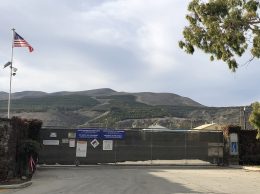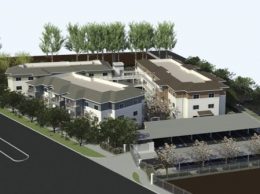Dubroff: Trump administration will reshape Mexican-American relations
IN THIS ARTICLE
- Columns Topic
- Henry Dubroff Author
By Henry Dubroff Friday, November 25th, 2016

Henry Dubroff
Amid talk about a Trump administration crack down on illegal immigrants and spending billions to build a wall across the southern border, Roberto Rodriguez sees a chance of the biggest reset in Mexican-American relations in 30 years.
Rodriguez knows a thing or two about that relationship. A 40-year veteran of Mexico’s foreign service, he began his career before NAFTA was conceived, before the Reagan -era immigration reforms and well before Donald Trump launched his political career.
Four months ago, he arrived on the Central Coast as Consul of Mexico in Oxnard, where he represents Mexican interests in Ventura, Santa Barbara and San Luis Obispo counties. His constituents include more than 500,000 Mexican immigrants and Mexican-Americans who make up about one-third of the population of the Tri-Counties.
During a Nov. 17 interview at the consulate, a two-story concrete building near the Oxnard Airport, Rodriguez talked about the risks and opportunities as Mexican-U.S. relations chart an uncertain path forward after an election that has left many immigration rights advocates in a state of shock.
Among the biggest risks, he said, was any effort to remove the temporary protection from deportation granted by the Obama administration to the “Dreamers,” more than 800,000 young adults brought to the U.S. as children by their undocumented immigrant parents.
“It would be very hard to return the Dreamers,” he said.
Also, he said the idea of taxing cross-border money transfers or remittances to pay for the border wall isn’t practical. Transactions already flow through the banking system and it is virtually impossible to identify which are business deposits and which are intra-family remittances, he said.
On the other hand, Rodriguez said, big breakthroughs in U.S.-Mexico relations often come during Republican administrations. That means potential opportunities ahead, particularly in trade, technology and agribusiness.
“I was quite surprised at the size of the economy in the three counties,” said Rodriguez, who has taken note of the technology corridor along Highway 101 and the presence of the only deep water port between Los Angeles and San Francisco.
Rodriguez said any opening of new conversations on trade could include a much bigger role for the Port of Hueneme, which has been aggressively pursuing new agribusiness customers.
“The Ports of Long Beach and Los Angeles are saturated,” he said, adding that one of his goals is to “promote the use of the Port of Hueneme” to accelerate trade, foreign direct investment and jobs, he said.
For all the rhetoric about repealing the North American Free Trade Agreement, Rodriguez said, NAFTA is more than 20 years old and implementation of its provisions are “almost completed.” In the 21st century, he added, “there are a lot of opportunities that have not been explored.”
He agreed with the growing view among some in agribusiness that as technology improves and labor costs rise, demand for the imported field workers who have been at the heart of the immigration debate for decades may shrink, perhaps substantially.
Meanwhile, Mexico, which protected its oil and gas industry for most of the 20th century, is opening up its energy markets. And there’s growing demand for U.S. medical products to treat obesity and diabetes, growing health problems in Mexico.
“We need more tools for our community in health and education,” he said.
So far, he said, the consulate has not seen a flood of questions about the new administration and Donald Trump’s threats of mass deportations. “We don’t know, yet,” he shrugged.
But with 6 million U.S. jobs dependent on commerce with Mexico and 570,000 businesses in the U.S. owned by Mexican nationals as well as more than $1 billion a year in foreign direct investment from Mexico to the U.S., there is a lot to this relationship besides the headline issues.
Resetting the U.S.-Mexico relationship around the idea of better economic growth for both countries was the goal behind NAFTA when it was first conceived in the 1980s.
And it still makes sense, said Rodriguez.
As long as both countries are focused on economic issues, a chance to reshape priorities could open the door to opportunity, he said, a chance to play a new hand. “Nueva bajara de cartas,” he said. The metaphor needed no translation.
It’s a new game, indeed, with a major reshuffling of the political deck.
• Reach Editor Henry Dubroff at [email protected].
Related Articles
 Friday, October 14th, 2022
Friday, October 14th, 2022









